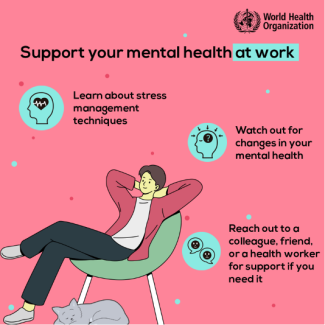Reflections on Mental Health Day 2024

On October 10th we observed world mental health day. I hope we were all able to take a moment to step back and evaluate the state of our own mental health and appreciate our own resilience and value while also being mindful of all that surrounds us that might contribute our general well-being as communities and society.
It is far more common for us to consider mental health in the context of its absence, i.e. poor metal health or mental ill-health or mental health disorder, however a more constructive point of departure that helps us begin to consider ways of maintaining good mental health and preventing the development of poor mental health might be to consider our understanding of the presence of good mental health. The World Health Organisation (WHO) defines mental health as “a state of mental well-being that enables people to cope with the stresses of life, realise their abilities, learn well and work well, and contribute to their community”. A further exploration of the concept of mental health can be found here.
The reality of the challenging times we find ourselves in is that the average human being is generally carrying a burden we cannot fully be aware of. It’s often said that we should all exercise patience and kindness at the very least because we cannot know what the next individual might be dealing with. As intentional as we should aim to be to extend kindness and compassion to each other, it’s equally, if not more important to direct ample kindness towards ourselves as well. The saying “Charity begins at home” is quite apt. When we begin to show ourselves patience, compassion and care, it becomes easier and more natural to extend the same to others. To quote another saying” One cannot pour from an empty cup.”
It is appropriate to acknowledge that we are not only affected by personal challenges related to relationships, finances and illness amongst many others, but by the broader global challenges that affect the stimuli we are faced with daily in social interactions, in the media and on social media. The burden of concern for the state of the world, and for our friends and colleagues in vulnerable circumstances can only weigh that much more heavily on us over and above our own challenges.
In formulating care planning for addiction, we contemplate the nature and extent of an individual’s recovery capital as a basis for exploring what resources the individual has on hand and within reach to assist them as the treatment plan starts and as it continues past the acute phase into the maintenance phase. Analogously, if we take a step back it is equally important that we keep running tabs on our own resources for self-care and maintenance of our mental well-being.
Some of these resources may be individual and may include meditation, exercise, diet and good sleep, some may be communal and including engagement with friends, significant and family, while others are institutional such as resources made available in the workplace. At a broader societal level there are several national and global resources and helplines that are available. I would like to suggest that not only for our clients, but for ourselves, we should seek to become well appraised of these resources, where they are located are and how to access them, thus shoring up our mental health support capital before we need it.
The theme for Mental Health Day this year was "It is Time to Prioritize Mental Health in the Workplace." The WHO shared some discussion outlining some protective and predisposing factors for poor mental health in the workplace and some resources to address these. Providers of care for mental health and addiction serve a special population with complex and challenging needs, facing therapeutic alliance issues such as transference and countertransference that without doubt have an impact on the treating clinician and may add to already existing personal burden and predispose to burnout. Our commitment to help can sometimes fall victim to outcomes that don’t meet our hopes for clients, complicated by times when we might feel out of depth to assist with specific areas of concern for our clients. Dr. Nathalie Panabokke presented an ISSUP Global webinar titled “Enhancing Well-being and Preventing Burnout Amongst Treatment Practitioners” focussed on practitioner well-being on 20 August this year. What was striking was the extent to which the struggles with burnout and general mental health distress resonated with our ISSUP audience. While this was not necessarily surprising, what was encouraging to see was the extent to which attendees were willing to share experiences, be heard and hear others. This was an excellent demonstration that when a safe space is created it becomes possible for us to be heard and feel seen and appreciate that our challenge is a shared one and does in fact not reflect on us a weakness in personality in any way. The session served well to normalise the burden of burnout and distress with the state of the world, both internal and external (global). Access the recording to the webinar by Dr. Panabokke here. SAHMSA’s “Compassion Fatigue and Self-care for Crisis Counselors" might be a useful resource for practitioners in addictions care as well. See the related reading section below for some additional resources that might interest.
Intentional actions towards good mental health are about giving ourselves the best opportunity for a more balanced and meaningful life. I encourage you to make sure you are helping yourself as well, while immersed in the wonderful work of helping others.
